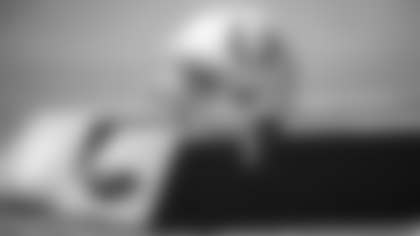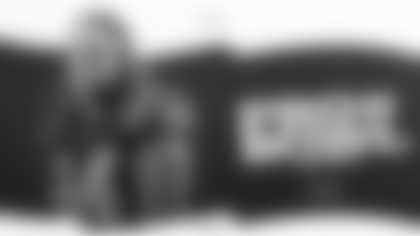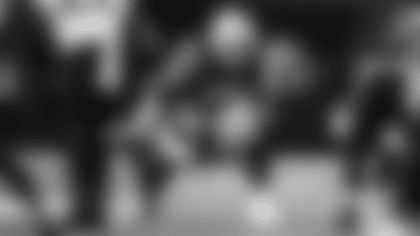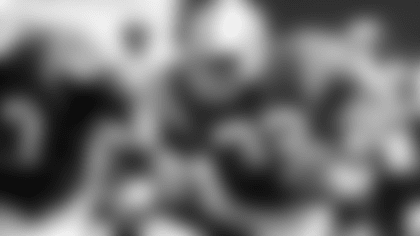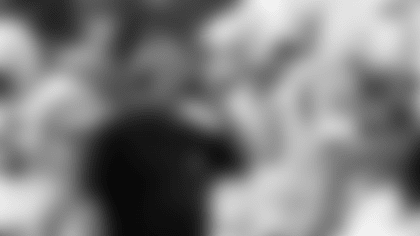[

](http://careyindiana.com)
INDIANAPOLIS –When Andrew Luck took the final snap of the first quarter for Team Sanders in Sunday's Pro Bowl, it marked the end of his season professional season.
It was a second season of accomplishment for the top overall pick in the 2012 draft.
Luck took every snap of his rookie season (1,109 total) and continued that streak into the fourth game of this year at Jacksonville, when he sat out for one last possession in a 37-3 victory.
Luck missed only six possessions – a total of 23 offensive plays – in three different 2013 games, and he has been under center for 2,109 of a possible 2,132 snaps as a Colt.
|
MOST CONSECUTIVE SNAPS BY INDIANPOLIS QBS | |
|
Number |
Player (*Denotes Career-Opening Streak) |
|
1,631 |
Peyton Manning |
|
1,590* |
Peyton Manning |
|
1,459 |
Peyton Manning |
|
1,400 |
Peyton Manning |
|
1,364* |
Andrew Luck |
|
1,205 |
Peyton Manning |
|
1,088 |
Peyton Manning |
Mirroring Luck's ability to stay on the field, Anthony Castonzo saw growth in Luck.
"He's a guy who makes you want to block that much harder for him," said Castonzo. "You know if you give him that extra second, he's going to make an outstanding play. Everybody loves to play with him."
Luck is one of eight quarterbacks in the Super Bowl era – Joe Flacco (5 straight seasons), Dan Marino (3), Bernie Kosar (3), Andy Dalton (3), Shaun King (2), Ben Roethlisberger (2), Mark Sanchez (2) and Russell Wilson (2) – to open a career with consecutive playoff appearances.
Luck was a compelling force with four touchdown passes and a fumble returned for a score in the Colts' 45-44 playoff win over Kansas City, one of 12 triumphs he helped lead in 2013 – one more than was achieved in 2012.
"What he was able to do this year better than he was before was mix his fire and 'want-to-win' with the ability to shake off bad plays," said Castonzo. "He was able to shake off bad plays a lot better this year.
"He'd come back and go, 'Let's take it one play at a time. Let's go onto the next play, the next play.' Really take it one play at a time. As he did that, he was able to make some pretty incredible plays."
Luck directed a 21-17 comeback win over Oakland to start the season, galloping 19 yards for the deciding score in the last quarter.
In the club's 34-28 win over then-undefeated Seattle, Luck hit T.Y. Hilton on a 73-yard scoring pass as Indianapolis started a recovery from a 12-point deficit.
Three second-half TD passes to Hilton (10, 59, nine yards) spurred a 27-24 comeback win at Houston, one game after Indianapolis defeated then-unbeaten Denver in a 39-33 nationally-televised thriller.
Luck's growth was evident in being able to cut down on the number of turnovers that came during his rookie season.
Luck helped the Colts set a franchise mark and lead the NFL with only 14 turnovers this past year. The club shaved its total from 27 in 2012, while Luck whittled his personal turnovers from 23 to 11.
Luck had only nine interceptions in 570 attempts, upping his completion percentage from 54.1 to 60.2 and his rating from 76.5 to 87.0.
|
MOST STARTING VICTORIES FIRST TWO SEASONS (Since 1950) | |||
|
Wins |
Years |
Name |
Team |
|
24 |
2012-13 |
Russell Wilson |
Seattle |
|
22 |
2004-05 |
Ben Roethlisberger |
Pittsburgh |
|
22 |
2012-13 |
Andrew Luck |
Colts |
|
21 |
1983-84 |
Dan Marino |
Miami |
|
21 |
1950-51 |
Otto Graham |
Cleveland |
|
20 |
2008-09 |
Joe Flacco |
Baltimore |
|
20 |
2008-09 |
Matt Ryan |
Atlanta |
Luck has been hardened terrifically by being able to play so extensively to date. Castonzo, who has a biochemistry degree, sees a product refined through the football laboratory.
"He's calloused but at the same time, he recognizes his mistakes. He's a guy who is going to learn from them and not make the same mistake twice," said Castonzo. "That's why if he makes a mistake I can honestly go up to him and say, 'It's not a big deal.' You know it's not going to happen again. He's going to play and not make that mistake again. It's almost like every year that he plays the more mistakes he adds up, they're going to dwindle as he gets older.
"There will be less and less because it's almost like antibodies. When you get the virus, your body gets used to it. Now, you've got antibodies to fight it off in the future. Every time he makes a mistake, it's another antibody that grows in him. It's not going to happen again in the future."



